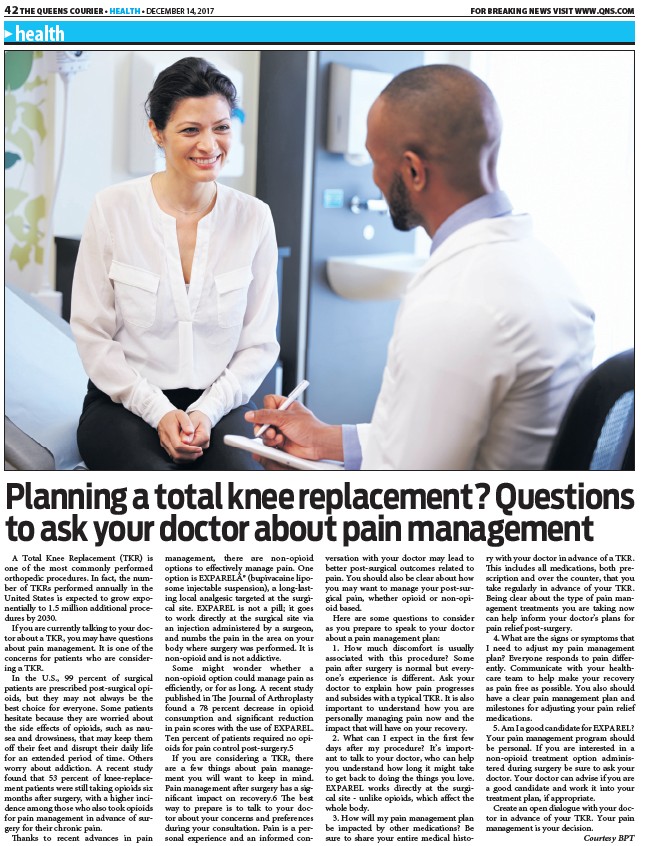
42 THE QUEENS COURIER • HEALTH • DECEMBER 14, 2017 FOR BREAKING NEWS VISIT WWW.QNS.COM
health
Planning a total knee replacement? Questions
to ask your doctor about pain management
A Total Knee Replacement (TKR) is
one of the most commonly performed
orthopedic procedures. In fact, the number
of TKRs performed annually in the
United States is expected to grow exponentially
to 1.5 million additional procedures
by 2030.
If you are currently talking to your doctor
about a TKR, you may have questions
about pain management. It is one of the
concerns for patients who are considering
a TKR.
In the U.S., 99 percent of surgical
patients are prescribed post-surgical opioids,
but they may not always be the
best choice for everyone. Some patients
hesitate because they are worried about
the side eff ects of opioids, such as nausea
and drowsiness, that may keep them
off their feet and disrupt their daily life
for an extended period of time. Others
worry about addiction. A recent study
found that 53 percent of knee-replacement
patients were still taking opioids six
months aft er surgery, with a higher incidence
among those who also took opioids
for pain management in advance of surgery
for their chronic pain.
Th anks to recent advances in pain
management, there are non-opioid
options to eff ectively manage pain. One
option is EXPAREL® (bupivacaine liposome
injectable suspension), a long-lasting
local analgesic targeted at the surgical
site. EXPAREL is not a pill; it goes
to work directly at the surgical site via
an injection administered by a surgeon,
and numbs the pain in the area on your
body where surgery was performed. It is
non-opioid and is not addictive.
Some might wonder whether a
non-opioid option could manage pain as
effi ciently, or for as long. A recent study
published in Th e Journal of Arthroplasty
found a 78 percent decrease in opioid
consumption and signifi cant reduction
in pain scores with the use of EXPAREL.
Ten percent of patients required no opioids
for pain control post-surgery.5
If you are considering a TKR, there
are a few things about pain management
you will want to keep in mind.
Pain management aft er surgery has a signifi
cant impact on recovery.6 Th e best
way to prepare is to talk to your doctor
about your concerns and preferences
during your consultation. Pain is a personal
experience and an informed conversation
with your doctor may lead to
better post-surgical outcomes related to
pain. You should also be clear about how
you may want to manage your post-surgical
pain, whether opioid or non-opioid
based.
Here are some questions to consider
as you prepare to speak to your doctor
about a pain management plan:
1. How much discomfort is usually
associated with this procedure? Some
pain aft er surgery is normal but everyone’s
experience is diff erent. Ask your
doctor to explain how pain progresses
and subsides with a typical TKR. It is also
important to understand how you are
personally managing pain now and the
impact that will have on your recovery.
2. What can I expect in the fi rst few
days aft er my procedure? It’s important
to talk to your doctor, who can help
you understand how long it might take
to get back to doing the things you love.
EXPAREL works directly at the surgical
site - unlike opioids, which aff ect the
whole body.
3. How will my pain management plan
be impacted by other medications? Be
sure to share your entire medical history
with your doctor in advance of a TKR.
Th is includes all medications, both prescription
and over the counter, that you
take regularly in advance of your TKR.
Being clear about the type of pain management
treatments you are taking now
can help inform your doctor’s plans for
pain relief post-surgery.
4. What are the signs or symptoms that
I need to adjust my pain management
plan? Everyone responds to pain diff erently.
Communicate with your healthcare
team to help make your recovery
as pain free as possible. You also should
have a clear pain management plan and
milestones for adjusting your pain relief
medications.
5. Am I a good candidate for EXPAREL?
Your pain management program should
be personal. If you are interested in a
non-opioid treatment option administered
during surgery be sure to ask your
doctor. Your doctor can advise if you are
a good candidate and work it into your
treatment plan, if appropriate.
Create an open dialogue with your doctor
in advance of your TKR. Your pain
management is your decision.
Courtesy BPT